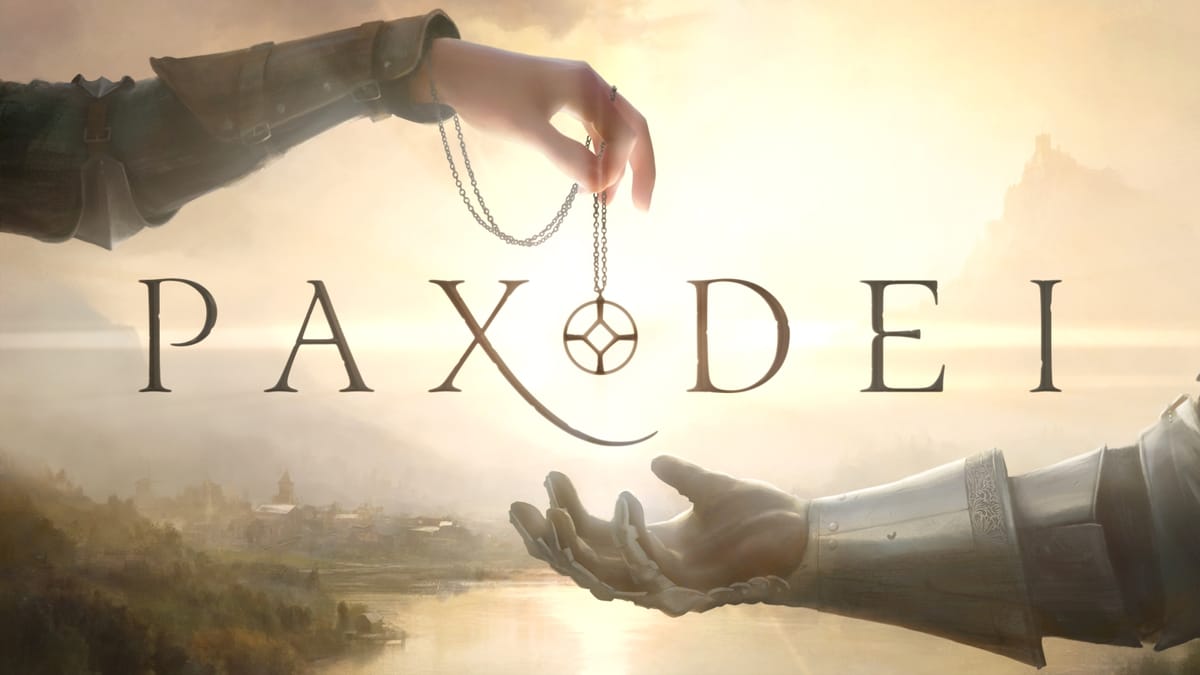
When I saw the trailer for Pax Dei I thought to myself that it’d be impossible to pull off an MMO with that level of graphics. Pretty characters and environments add up quickly when you start stuffing the screen full of beautiful lighting, gorgeous terrain, and draw distances that rival most flight simulators. Add in the ability for players to build massive and sprawling structures and it’d need an RTX 4090 to run, right? Well, developer Mainframe Industries not only believed they could create the next generation of social MMOs, they also combined some of the best elements of my favorite games into something that has limitless potential. Let’s pull back the curtain on the next generation of social MMOs.
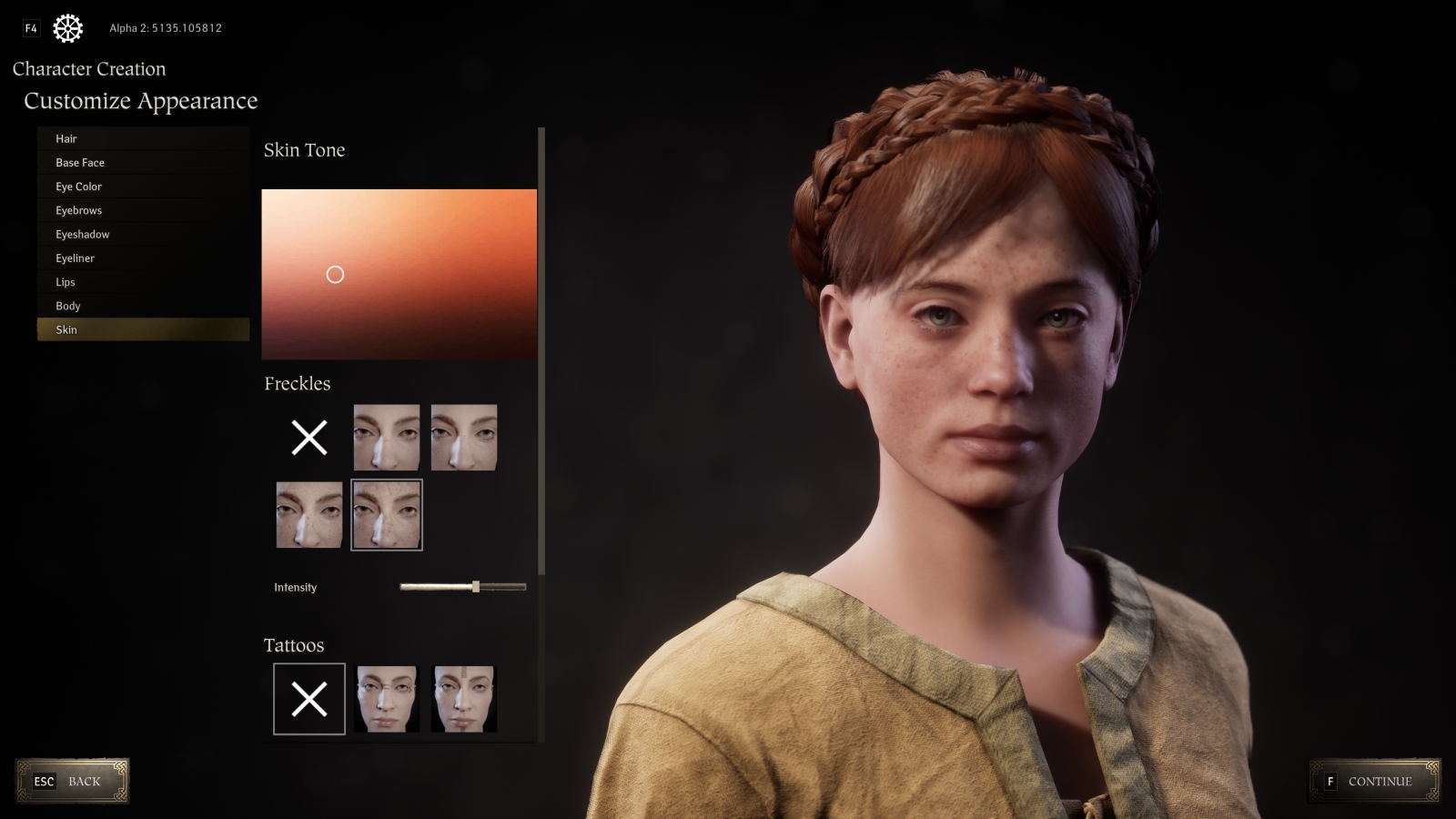
Pax Dei translates to English as “The Peace of God” – a proclamation of members of the clergy that conveyed immunity from violence to non combatants who would otherwise be unable to defend themselves. This simple phrase acted as a verbal shield for peasants, the poor, the weak, and the clergy themselves. It also serves to set up the world of the game. Inspired by the legends of the medieval era, magic exists, ghosts and other spirits are real (and dangerous!), and the myths and legends are waiting around every corner for you to discover.
At this early stage of development, the major social element that serves as the foundation of Pax Dei is mostly built – forging your own world. The game has an incredibly large swath of land to explore, but you’ll eventually want to settle some place to call home. There are no restrictions about where you choose to do that, so wherever your wandering heart leads you is where you can sink in roots. Thousands of other players will also be looking to do so, but with the way the game servers are sharded, it’s not as crowded as you might expect. It’s also a very, very good thing to stick close to your neighbors, at least to some degree, but we’ll get back to that in a moment.
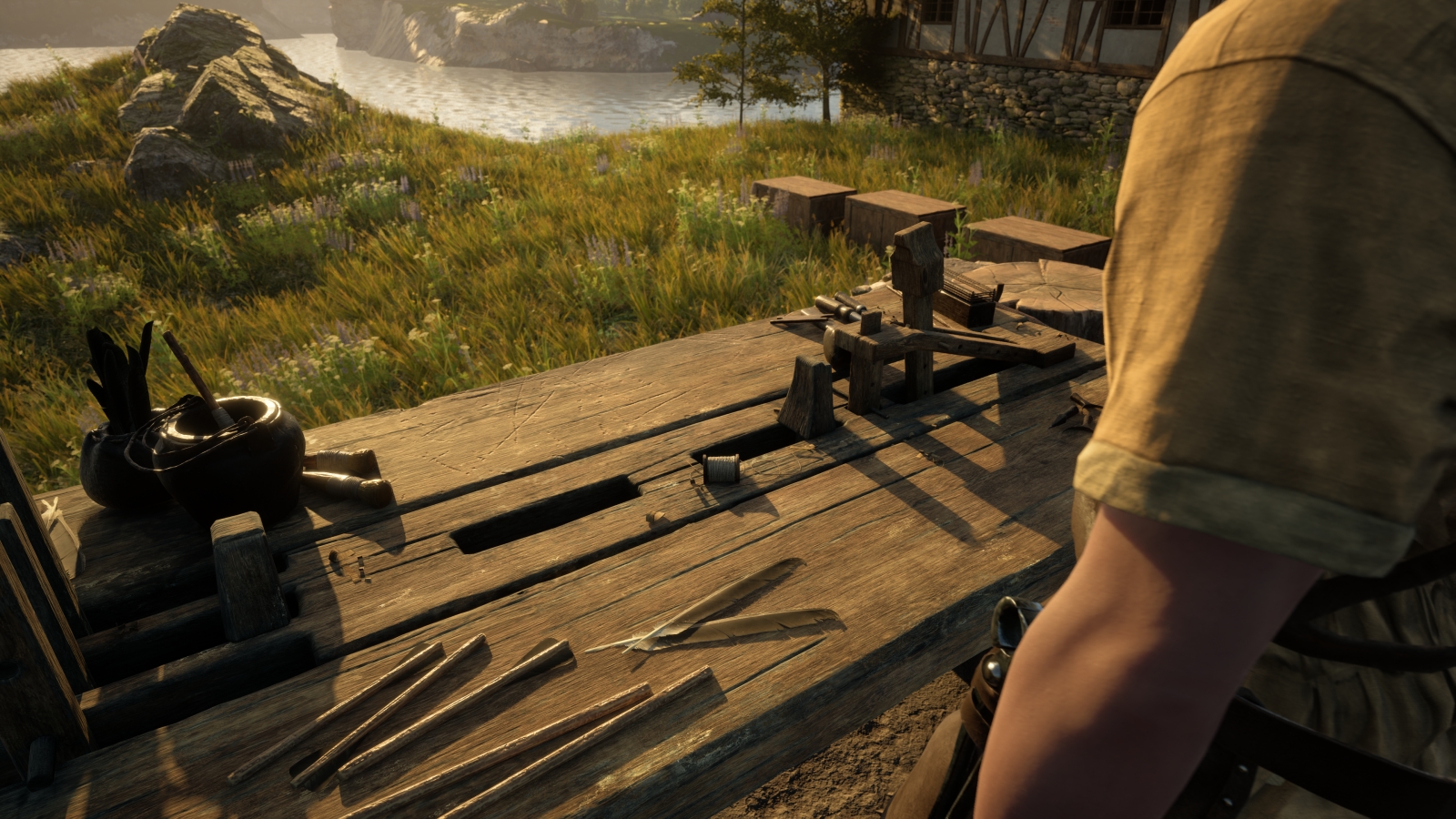
Opening the map, you’ll see sprawling hills, lowlands, grass, fields, mountains, and more. Laura and I set out to find some place with a few biomes within reach, with an emphasis on water, wood, and minerals. We trekked into the lowlands and found a Y in a nearby stream on the map. As we approached we found several other settlements in the distance, with a large mining encampment overlooking the valley in the distance. Opening the settlement window we were able to stake our own portion of the land near these other settlements. Laura and I were teamed up, and when she claimed her own area, we were surprised to find that it combined. It turns out, this is a key element of the social aspects of the game. A small set of homes is just that, but moving close together and with enough people, you suddenly have a small village. As you expand and move up the tech tree, you’ll slowly transform your budding village into a small thriving community. That community can become a town, and ultimately a fortress. While there’s a great deal of development ahead that could expand this even further, the bones are already here.

It turns out that in Pax Dei there are no NPC settlements. The adventure comes from exploration. There are no NPCs standing around waiting for you, instead asking you to branch out and find your own stories with your friends. The draw distance is near infinite, so that cave you see in the distance might hold untold riches, valuable recipes and resources, and much more – it’s yours to discover. As you’ll soon discover, danger lies around every corner, so prepare before you strike out lest you suffer the consequences.
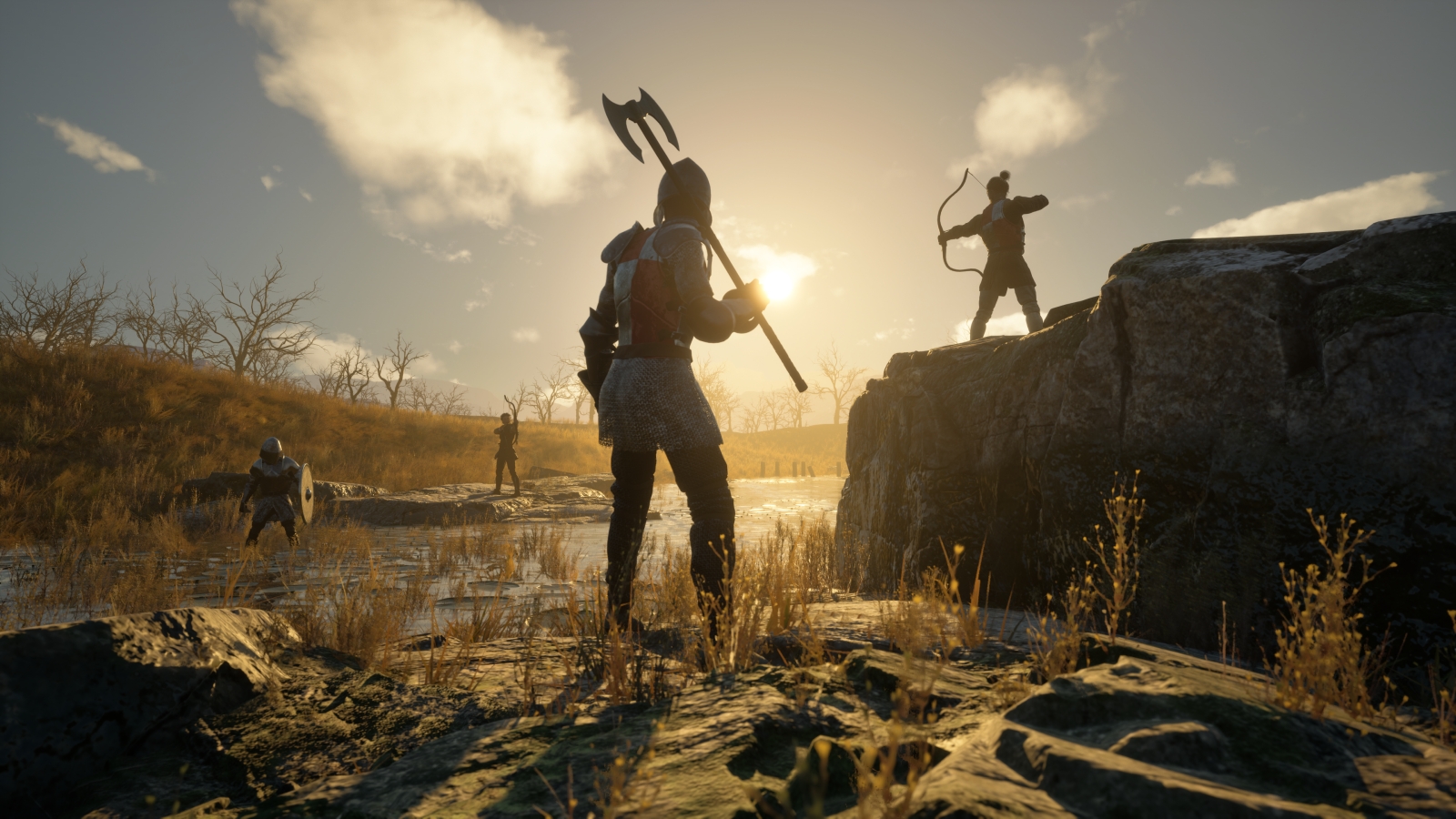
Making your home and building your character blends two of my favorite creative games – Ultima Online and Valheim. When you make your character you essentially know nothing. Using a rock on a stick makes a sharpened stick, unlocking a handful of recipes that involve sticks and rocks, such as a crude axe. Using the crude axe on trees yields logs, and logs can be split for smaller wood pieces, or honed into structures to move past simple waddle and mud to something more permanent. A wooden log and a stone anvil grants you the ability to further refine your tools and materials, and so it goes until you reach ore and ultimately metal crafting. Every time you build something, you get better at building with that material. When you get into a scrape, you’ll gain proficiency with the weapons you use to defend yourself. No matter what you’re doing, you’re earning skill proficiency. This system allows you to effectively create your own character from the dozens of skills available. Want to be an archer? Build a bow and practice. Want to be a spearman? Sharp sticks get you started, with throwing javelin and pilum being in your future.

Building in Pax Dei is very similar to the voxel-based system of Valheim. Using a grid-like system, snapping, and hand-placement, you’ll be able to build just about any structure you can imagine. In the beginning you’ll probably make crude square structures, but it won’t take long until you start seeing amazing and inspiring structures. A visit to that mining camp on the hill revealed that it was actually a combination ore mine, farm, and windmill. Even the developers we were playing with were surprised at the complexity of the structure. They used their tools to count up the elements of the structures, discovering that there were over a million elements assembled here. What was amazing, however, is that it has absolutely no impact on my performance whatsoever. I was running the game on a laptop with an RTX 2080 Super in it and the game was humming along just fine.
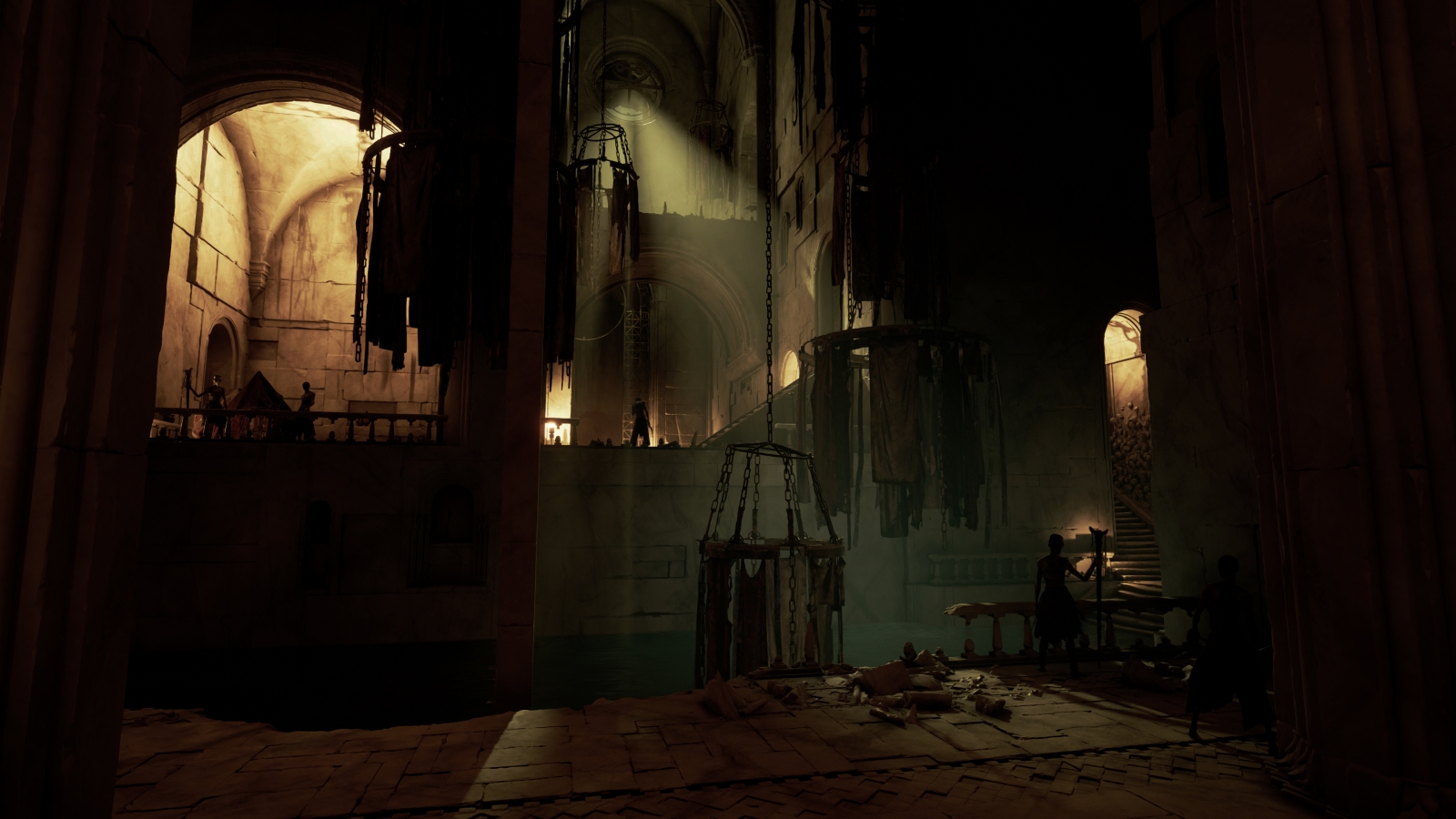
Amazingly, the system requirements are nowhere near as high as one would expect, even at this early stage of development. Windows 10 and DirectX 12, 16GB of system memory or more, an NVIDIA GeForce RTX 2070 or Radeon RX 5500 XT, and 60GB of space running on an SSD was surprisingly smooth, thanks to a well-optimized Unreal Engine 5 implementation. DLSS and FSR are baked directly into the engine already, so it’s likely you’ll be able to take advantage of some level of upsampling right out of the box.
If you ever played social MMOs like Ultima Online, then you know that a major chunk of the players never went to war against other groups, or even loaded up for combat. Instead, they baked bread, crafted items, brewed potions, and other support aspects. I made furniture when I played, and I enjoyed the heck out of it. Pax Dei is aiming to accomplish the same task, and to that end, the crafting system operates the same way as the character advancements. The more you perform the side activities, the better you’ll be at them, uncovering new recipes and skills.

At the time of writing, crafting starts off rather difficult. You’ll look at the menu and see that the recipes you do know are marked as such. When you do succeed, you’ll gain skill, and the icon will change. Do it enough and that icon will say “trivial”, meaning you no longer gain XP from doing it. Some new recipes are discovered this way, but many are found out in the world – another reason to get out and explore.
Whether you’re uncovering new spells and combat techniques, or constructing new and more imaginative structures, the other hidden strength of a “do it till you are good at it” system of advancement provides two advantages. The first is that you can always team up with your friends. Sure, they may not know how to use the equipment you just handed them, but that doesn’t mean they can’t use it, or that they’ll be completely ineffective. Second, it means that Mainframe can introduce new skills at will, and you won’t be locked out of using them. If you want to use the new skill, simply start doing so and learn it – there are no barriers to entry here. It also means everyone matters. Whether you are on the front lines, or supporting the warriors from behind, your skills matter. This tends to build a really strong community, and it allows everyone to play in a way that’s satisfying for them. Somebody has to stay behind and bake bread, and that somebody is me.

The team at Mainframe have stated that they intend to stay in Early Access for at least a year. In that year they’ll be adding more to the homesteading, adventure, and civilization pillars that make up the main portions of the game. This means new building techniques and materials, additional crafting and tailoring, additional progression elements including adding PvP to the established PvE, new loot and foes, clans, a whole feudal system, and much more. When the player is the key to every aspect of the game, it’s critical that all of these aspects interlace and function as a unit, so these next few months will be critical.
I’ve got good news to share – you don’t have to take my word for any of this as a brand new batch of invites heads out shortly after you read this. Starting on June 7th there will be a preview week, ending on June 12th in which another 8000 players will get to try the game for themselves. If you don’t get into that batch, don’t fret – Early Access is right around the corner, starting on June 18th and running continuously until launch from then on.
There are three preorder tiers for Pax Dei’s Early Access launch, and each offer a different bundle of goodies. The Founder’s Pack Journeyman will provide a single plot of land, two character slots, Founder’s Finery and Chausses, shoes, a mantle, coronet, and an emblem, as well as a special founder Discord role for you to keep forever.

The Artisan tier will expand that to two plots of lands, four character slots, all six of the previous outfits, as well as several items to dress your buildings. These include a Hunter’s chandelier, drinking horn, table and bench, and triptych tapestry set.
The final tier, entitled the Master tier, has the outfits and lodge decorations from the previous offerings, but also provides six character slots, four plots of land, and adds a Wyvern sconce, wind vane, support beam, short and long beam types, and short and long poles to help build an amazing and stylized building type, once you reach that tier of materials.
All three also provide access to the game, of course, and you can join at playpaxdei.com at any time. There’s a reason that Pad Dei continues to show on any most-anticipated list, and I cannot wait to experience this already-fantastic next-gen social MMO with all of you.
Pax Dei enters Early Access on June 18th, 2024 on Steam and PlayPaxDei.com
